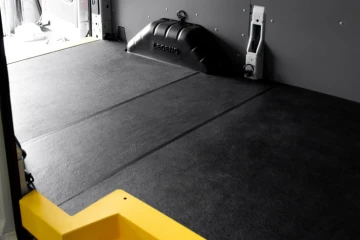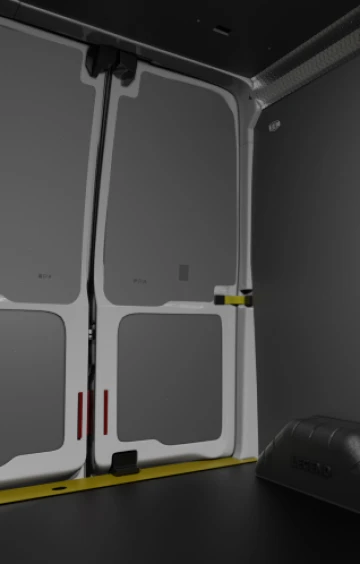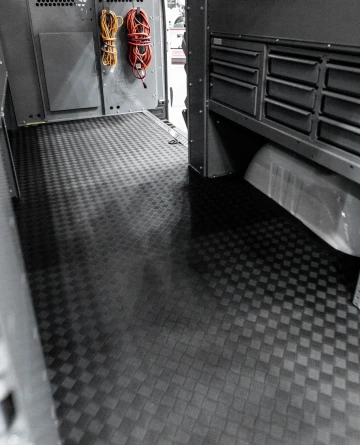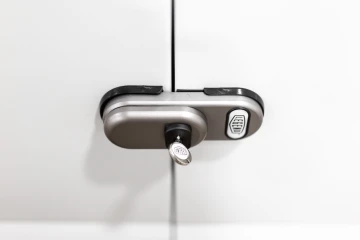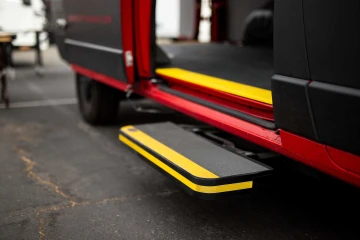12 Sep 24
Slips, Trips & Falls - Why it Matters for Work Vans
In the fast-paced world of fleet management, where every detail counts, slip-and-fall incidents can become more than just a nuisance—they can lead to substantial financial losses and operational disruptions. From soaring workers' compensation claims to the impact on employee morale, the consequences of neglecting slip and fall prevention are far-reaching. .jpg)
THE COST OF SLIPS, TRIPS AND FALLS ON YOUR FLEET
IT IS A HEAVY FINANCIAL RISK
Slip-and-fall incidents represent a major liability for fleet operators. According to the National Safety Council (NSC), these accidents are among the most common workplace injuries. The financial implications are significant: increased workers' compensation claims, rising insurance premiums, lost productivity, and potential lawsuits.
 Slippery floors are a major liability, potentially leading to costly legal trouble. The key issue in lawsuits is often the company's duty of care—how effectively it prevents slip hazards. Failure to implement proper precautions can be seen as negligence, leading to expensive settlements and reputational damage.
Slippery floors are a major liability, potentially leading to costly legal trouble. The key issue in lawsuits is often the company's duty of care—how effectively it prevents slip hazards. Failure to implement proper precautions can be seen as negligence, leading to expensive settlements and reputational damage.
Moreover, workers’ compensation laws add complexity, as employees are often entitled to compensation regardless of fault. Average settlements range from $10,000 to $50,000, not including legal fees and administrative costs.
IT TANKS EMPLOYEE MORALE
In the end, it's not just about avoiding lawsuits; it’s about safeguarding your business and protecting your drivers. Ignoring slippery conditions can lead to much bigger problems than you might expect. For fleets, the risks are even higher.
 Beyond the financial burden, these accidents can result in permanent disability or even death—a scenario no fleet owner wants to face. The emotional toll on both the injured employee and the broader workforce is just as heavy. Preventing slip hazards is not only about minimizing liability but protecting the well-being of your drivers and ensuring smooth operations for your fleet.
Beyond the financial burden, these accidents can result in permanent disability or even death—a scenario no fleet owner wants to face. The emotional toll on both the injured employee and the broader workforce is just as heavy. Preventing slip hazards is not only about minimizing liability but protecting the well-being of your drivers and ensuring smooth operations for your fleet.
IT’S A DRAIN ON YOUR OPERATIONAL EFFICIENCY
Each slip-and-fall incident can lead to costly downtime and operational disruptions. When an employee is injured, it’s not just their work that’s affected—there’s also the ripple effect on your entire fleet. Operations may slow down or come to a halt as you address the incident, manage workers' compensation claims, and deal with potential lawsuits. The need to temporarily replace injured workers or adjust schedules further strains your resources and hampers productivity.
-(1).jpg) The cumulative impact of these disruptions can be severe, affecting your bottom line and compromising the overall efficiency of your fleet. In addition, the administrative burden of handling these issues consumes valuable time and effort, pulling focus away from core business activities and slowing down growth.
The cumulative impact of these disruptions can be severe, affecting your bottom line and compromising the overall efficiency of your fleet. In addition, the administrative burden of handling these issues consumes valuable time and effort, pulling focus away from core business activities and slowing down growth.
HOW UPFITTING CAN HELP
Just like any workplace, taking proactive steps to minimize slipping hazards in your fleet can safeguard your business from costly slip-and-fall incidents.
 HOW TO MAKE YOUR VAN SLIP-PROOF
HOW TO MAKE YOUR VAN SLIP-PROOF
Slip-and-fall incidents are an absolute nightmare for everyone involved—from the injured employee to the fleet manager dealing with the aftermath. The good news is that you can take proactive steps to shield your vehicles from these risks.
FLOORING: YOUR FIRST LINE OF DEFENSE
The floor of your van is arguably the most CRITICAL component when it comes to minimizing slip-and-fall accidents. It's the surface your employees interact with most frequently, making it the area with the highest potential for injuries. Upfitting your vans with high-quality, slip-resistant flooring can make a significant difference in safety and operational efficiency. Here's how:
Prevents Known Risks
Installing composite grippy flooring directly addresses the common hazards that lead to slips and falls. Materials like LEGEND's StabiliGrip and EVOLVE floors are engineered to provide superior traction, reducing the likelihood of accidents. By proactively mitigating these risks, you keep your employees safe and maintain uninterrupted productivity.
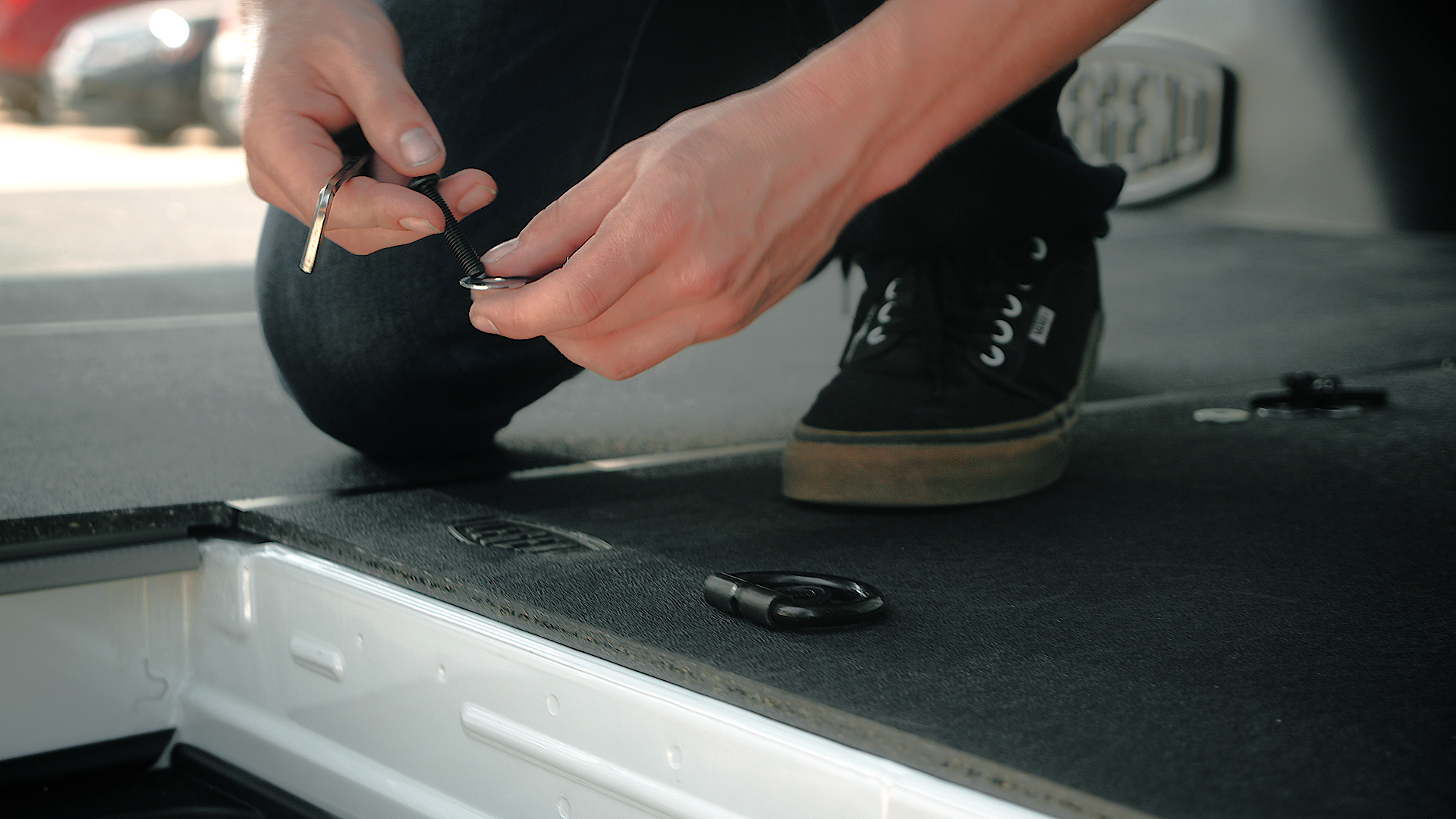
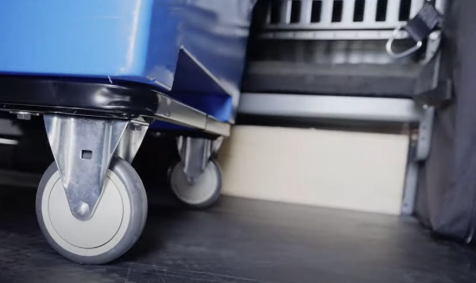
Exceeds Safety Standards with a High COF
Understanding the coefficient of friction is crucial in selecting the right flooring. The COF measures how much resistance a surface provides against slipping—the higher the number, the better the grip. Safety organizations like the American Society for Testing and Materials (ASTM) and the Occupational Safety and Health Administration (OSHA) recommend a minimum COF of 0.5 for slip resistance. The Americans with Disabilities Act (ADA) sets the bar even higher at 0.6 for accessible flooring.
LEGEND's StabiliGrip and EVOLVE floors exceed these standards, offering COF ratings of 0.85 when dry and 0.8 when wet. This ensures maximum slip resistance, even when moisture is involved.
GRAB HANDLES & THRESHOLDS: EXTRA GRIP WHERE IT’S NEEDED
Steel Grab Handles
With high-visibility yellow coating, these grab handles offer crucial support on slippery surfaces and during heavy equipment handling. They help maintain balance when climbing in and out of the van, reducing slip-and-fall accidents and enhancing operational efficiency by speeding up loading and unloading, especially in adverse weather. This added safety feature not only prevents injuries but also contributes to more consistent productivity across your fleet.
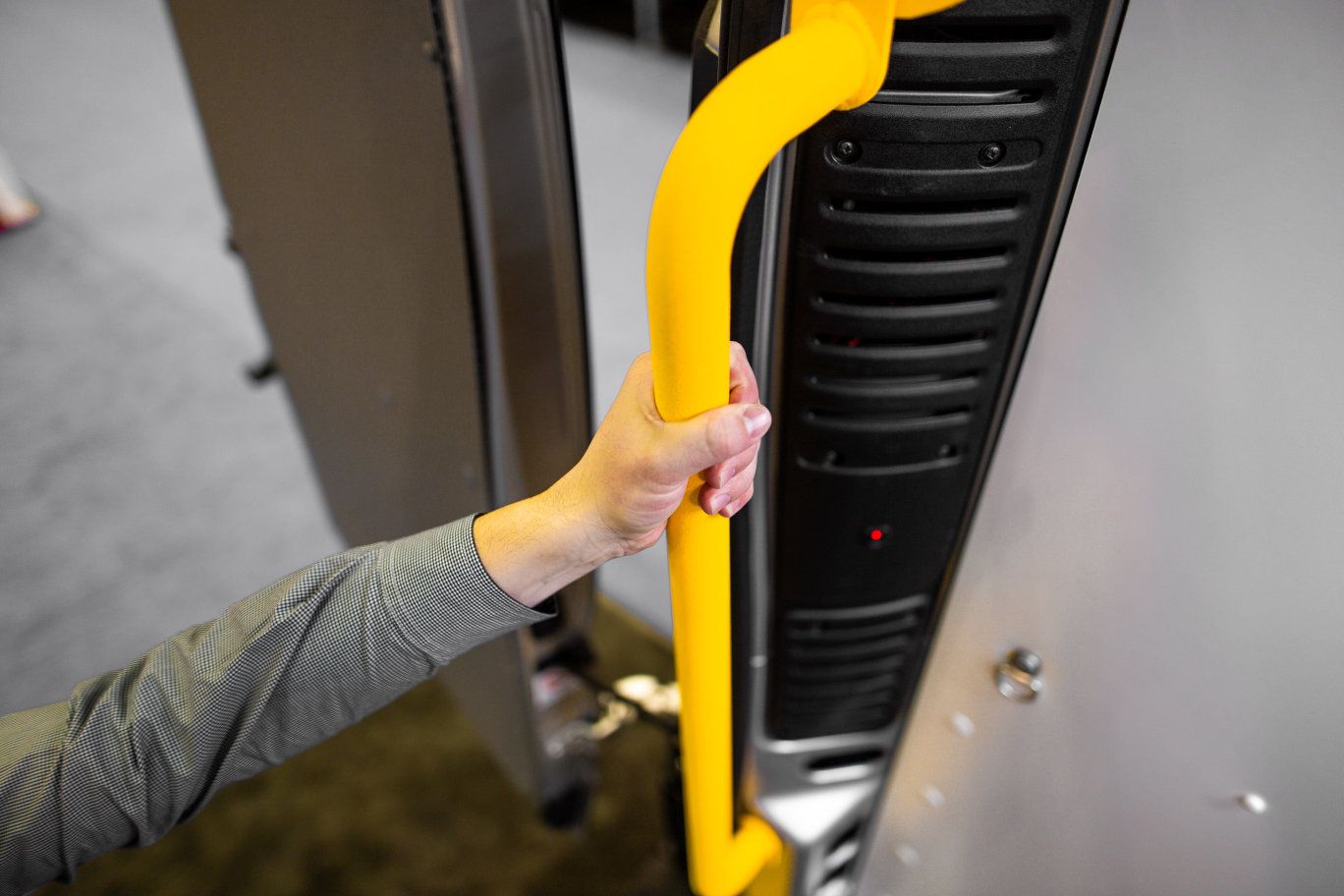
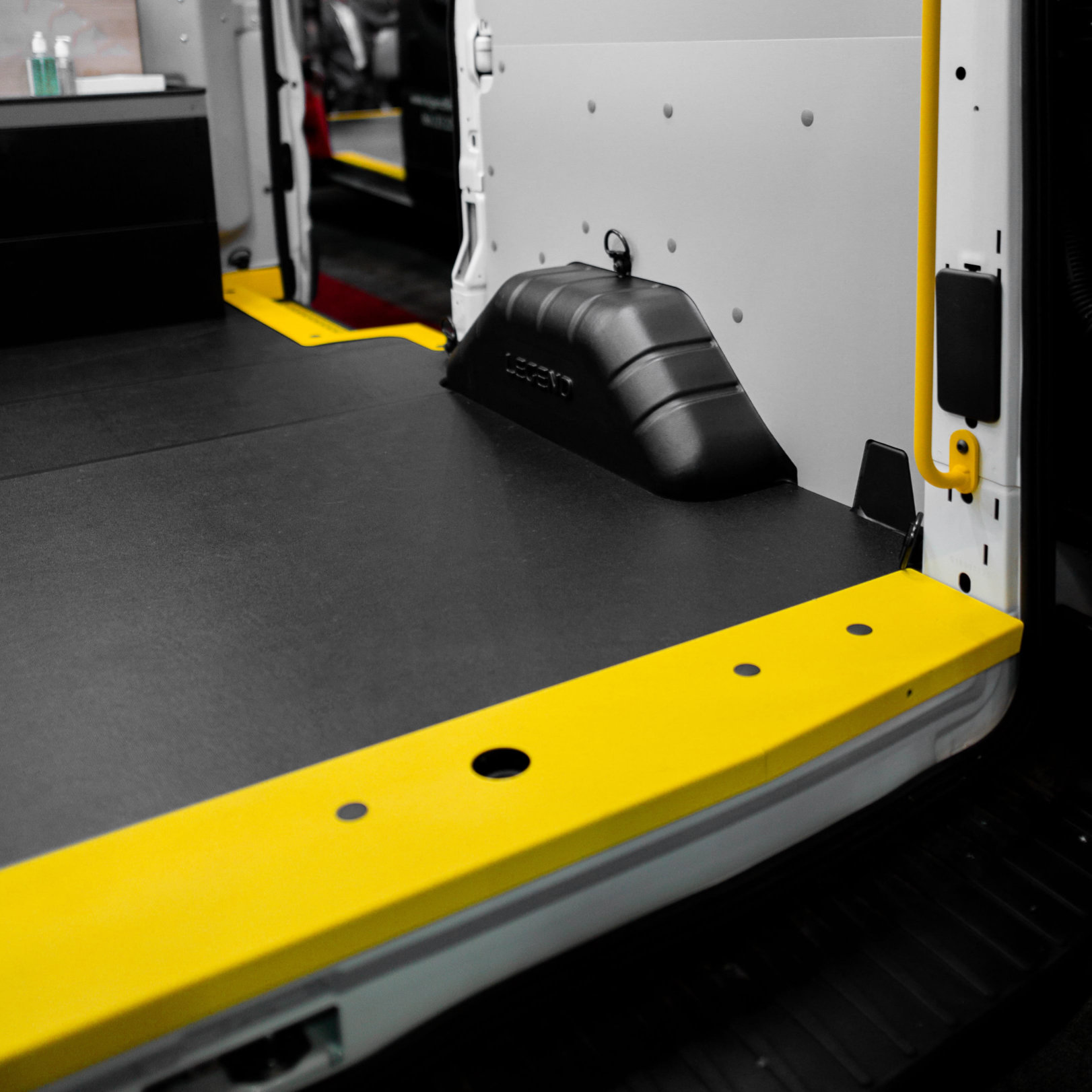
Steel Thresholds
Steel thresholds are a vital safety upgrade for the high-risk entry and exit points of your vans. High-quality 14 gauge steel thresholds with a non-slip finish upgrade safety at high-risk entry and exit points. Their 2-in-1 design, which includes rear and side thresholds, offers comprehensive protection where slips and falls are most likely to occur.
By reinforcing these high-traffic areas, steel thresholds help ensure a stable footing for drivers and operators, reducing the risk of accidents during cargo loading and unloading.
UpStep RS3: SAFE VEHICLE ENTRY
The UpStep RS3 is a game-changer for van safety, addressing slip and fall risks with its advanced design. This step features a large, non-slip surface that provides secure footing, even in wet or icy conditions.
.jpg)
Unlike traditional steps, the UpStep RS3's mechanical operation avoids potential failures and maintenance issues, ensuring reliable performance. Its robust construction can support up to 771 pounds, making it suitable for heavy use while maintaining stability. By incorporating the UpStep RS3, you enhance accessibility and significantly reduce the likelihood of slip and fall incidents.
SAFETY PRECAUTION = PROTECTION FROM SLIPS, TRIPS & FALLS
Slip and fall incidents can be a costly and complex issue for any fleet manager. While worker’s compensation provides coverage for employees who are injured on the job, it does not absolve employers of their responsibility. In the event of a slip and fall, you may still face increased insurance premiums, legal fees, and operational disruptions.
.png) By proactively upfitting your vans with high-quality solutions like StabiliGrip flooring and essential accessories, you can significantly reduce the risk of these incidents. Investing in these safety measures not only helps protect your employees but also shields your business from potential financial and operational setbacks.
By proactively upfitting your vans with high-quality solutions like StabiliGrip flooring and essential accessories, you can significantly reduce the risk of these incidents. Investing in these safety measures not only helps protect your employees but also shields your business from potential financial and operational setbacks.
To see how StabiliGrip can make a difference in your fleet, learn more about its grippy properties here.
Share Article
Related news
View all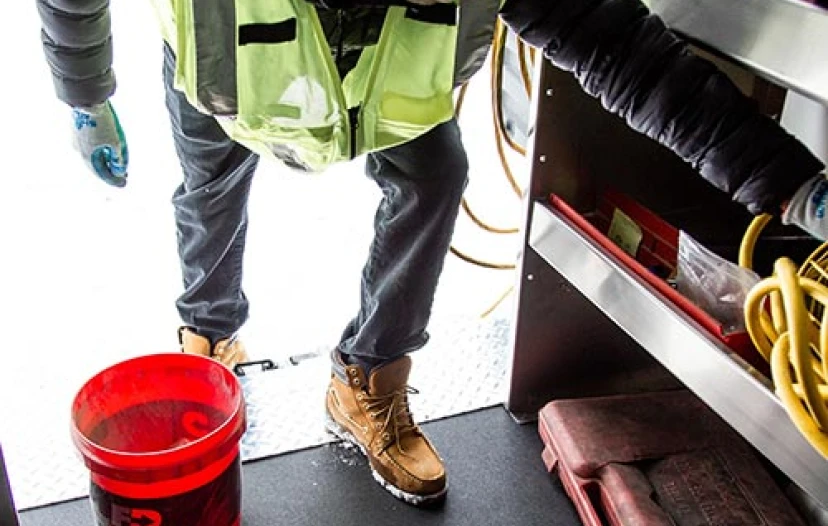
Coefficient of Friction: What is it?
Why this little-known factor could save your cargo fleet.
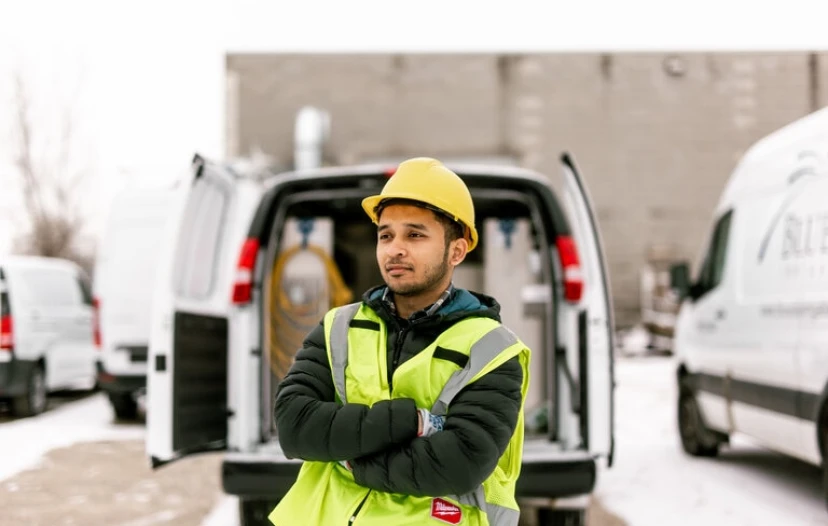
How Van Upfitting Keeps Your Fleet Employees Safe & Happy
Van upfitting transforms your fleet into a safer & more efficient workplace by boosting employee morale, safeguarding well-being, reducing turnover, and driving productivity.
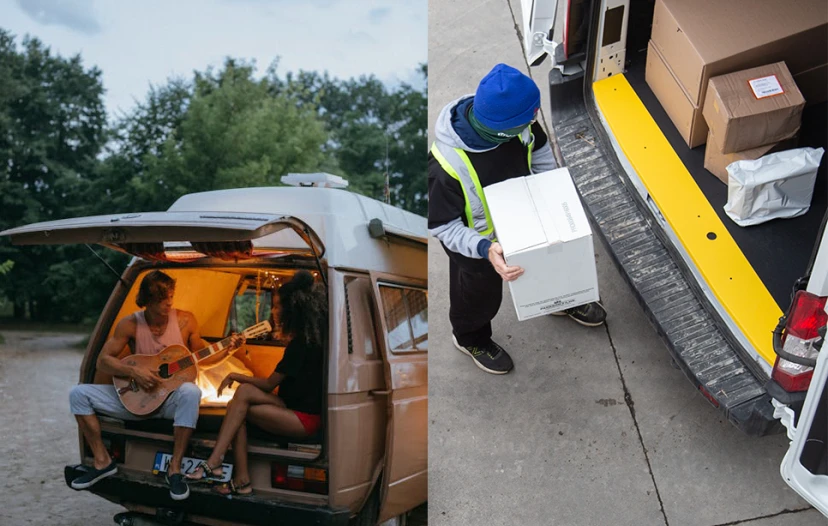
Why is Legend NOT a Good Fit for Me?
Our solutions prioritize safety, vehicle preservation, noise reduction, and climate control. If these aren't your top priorities, our offerings may be more than you need.





